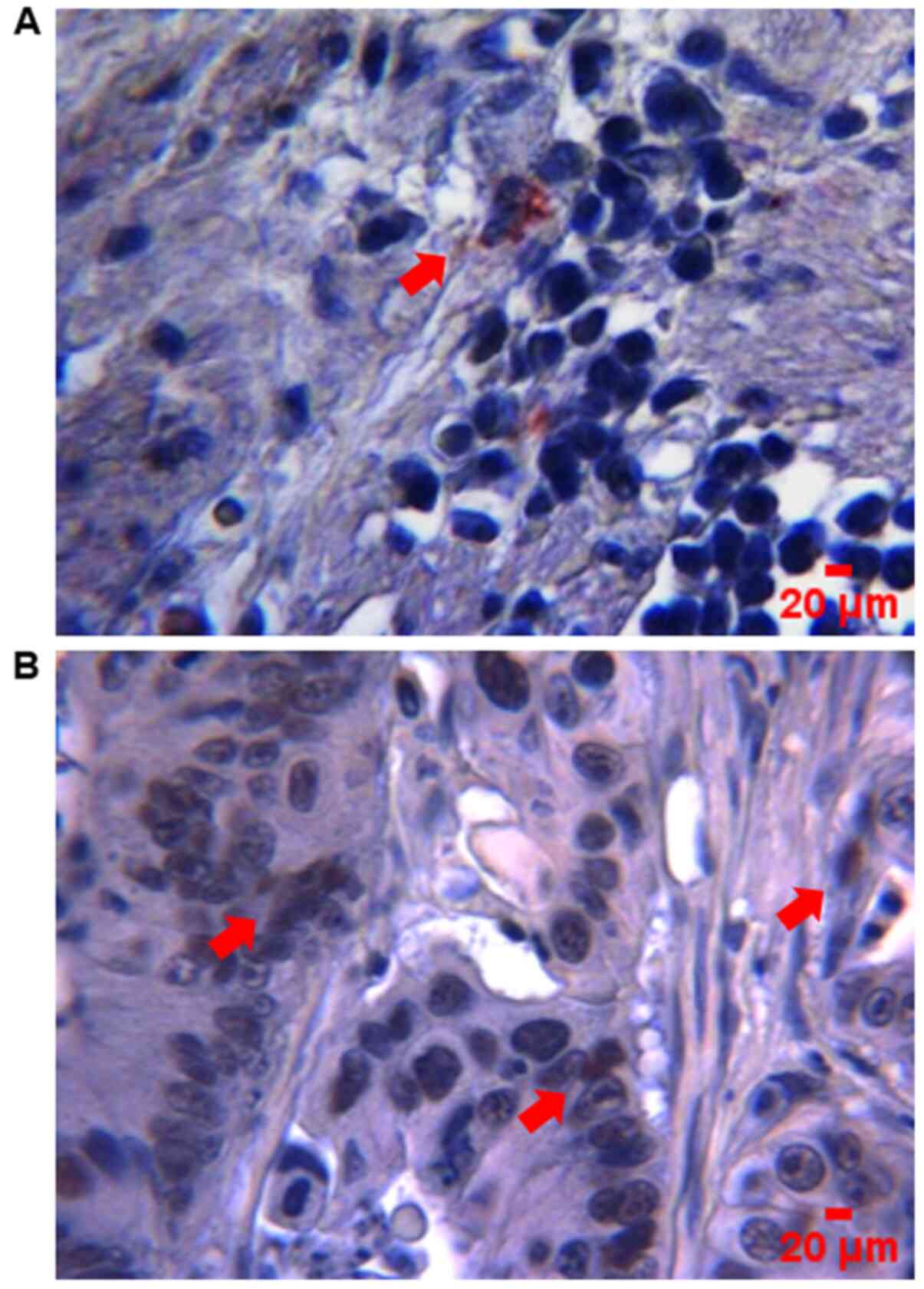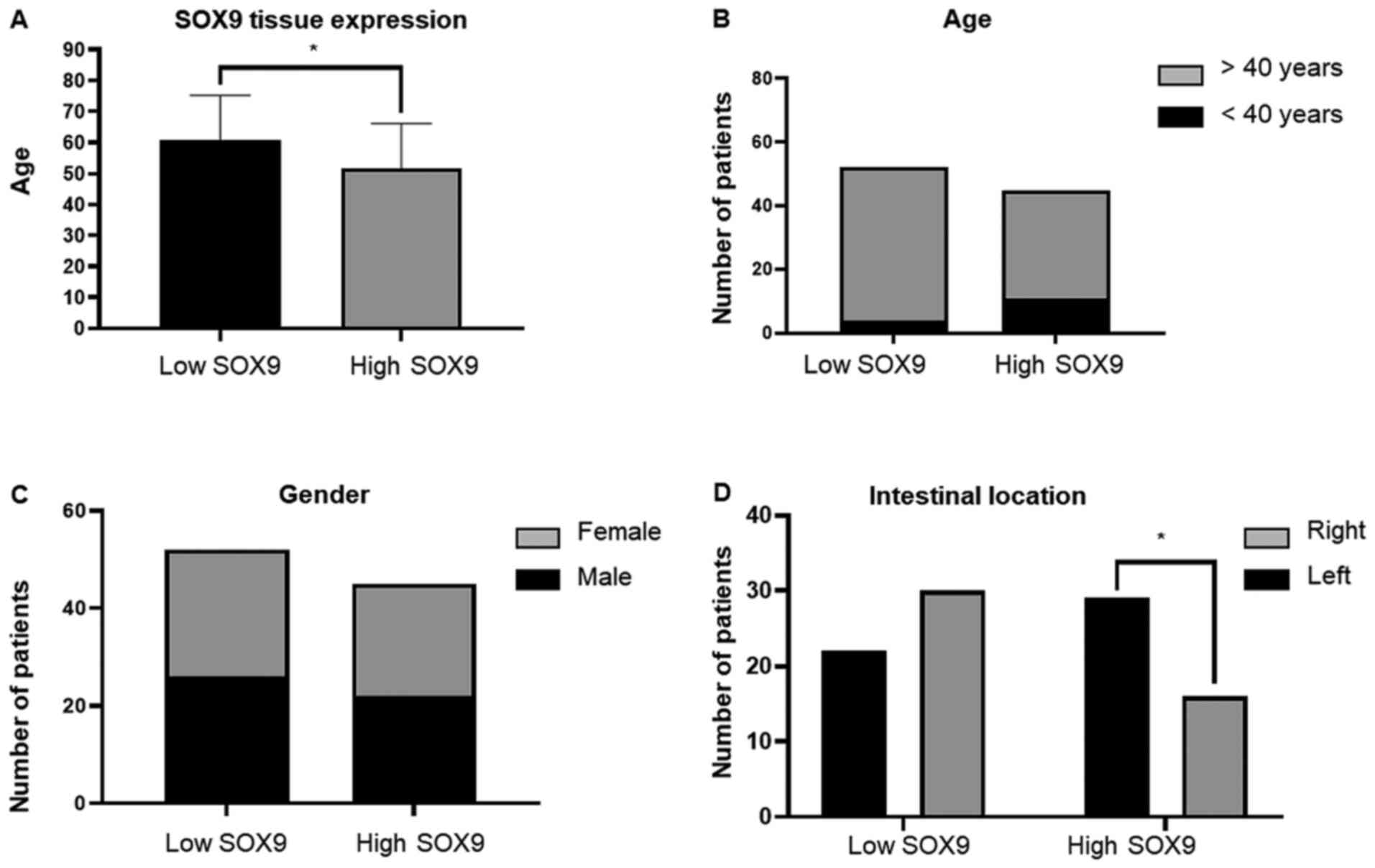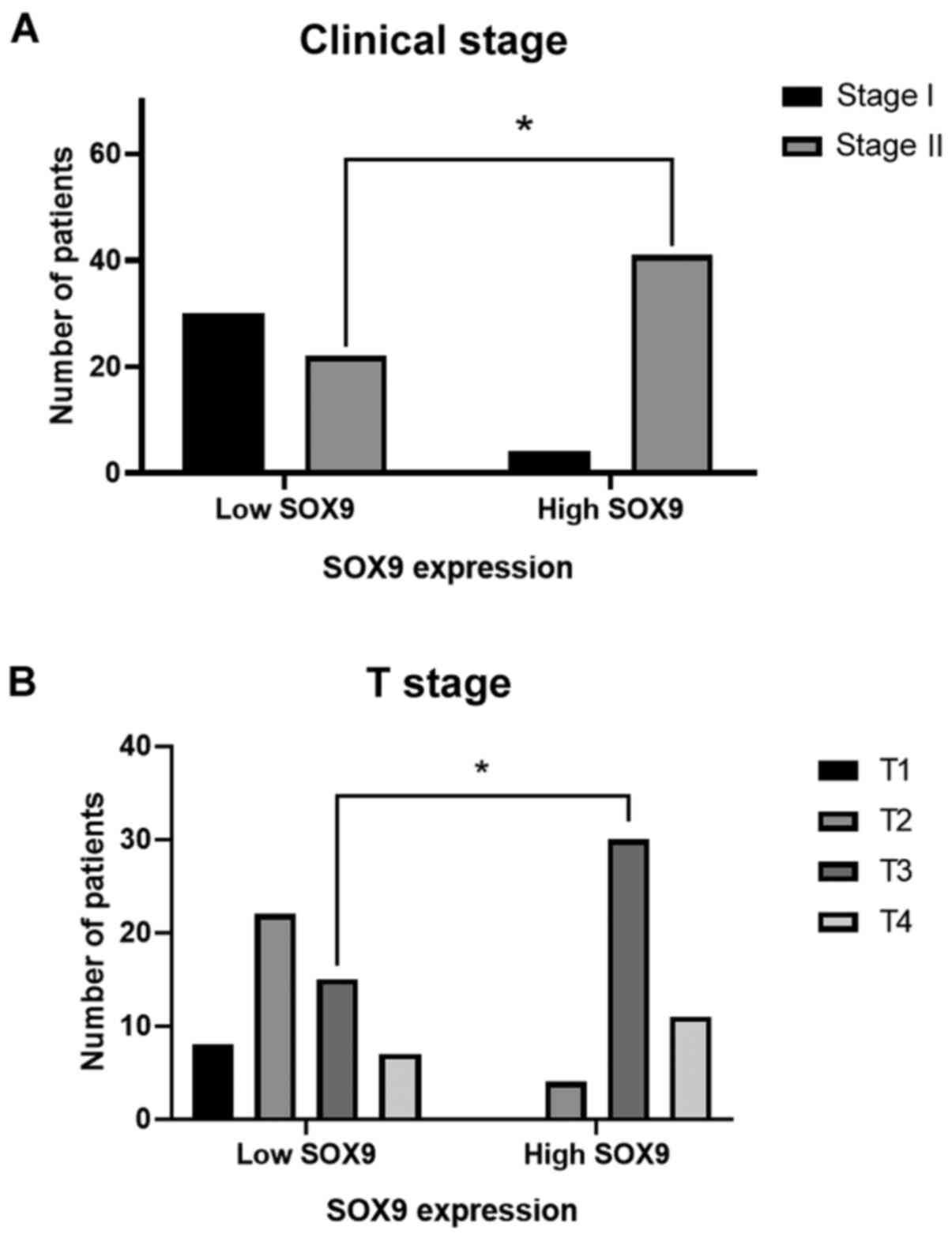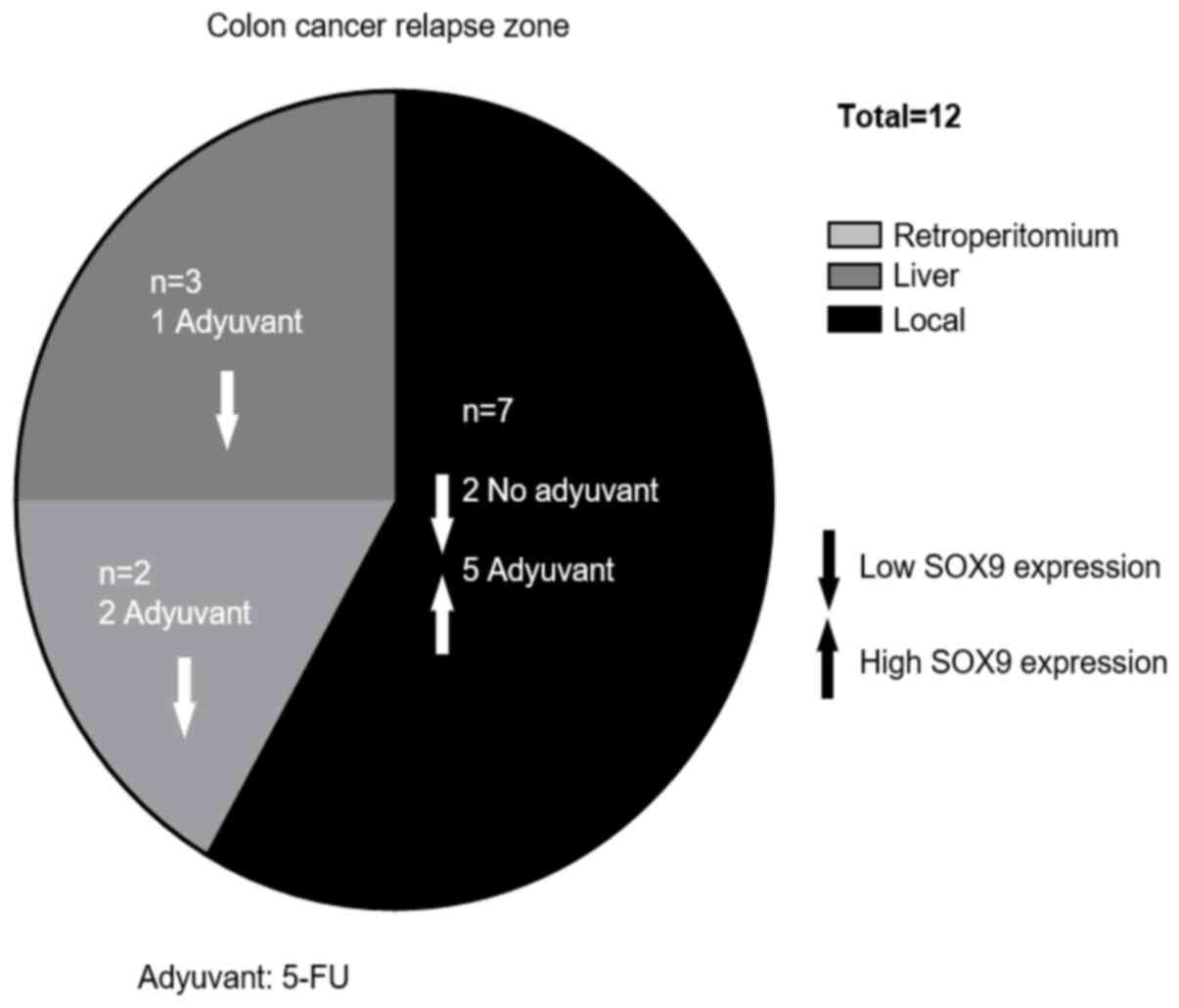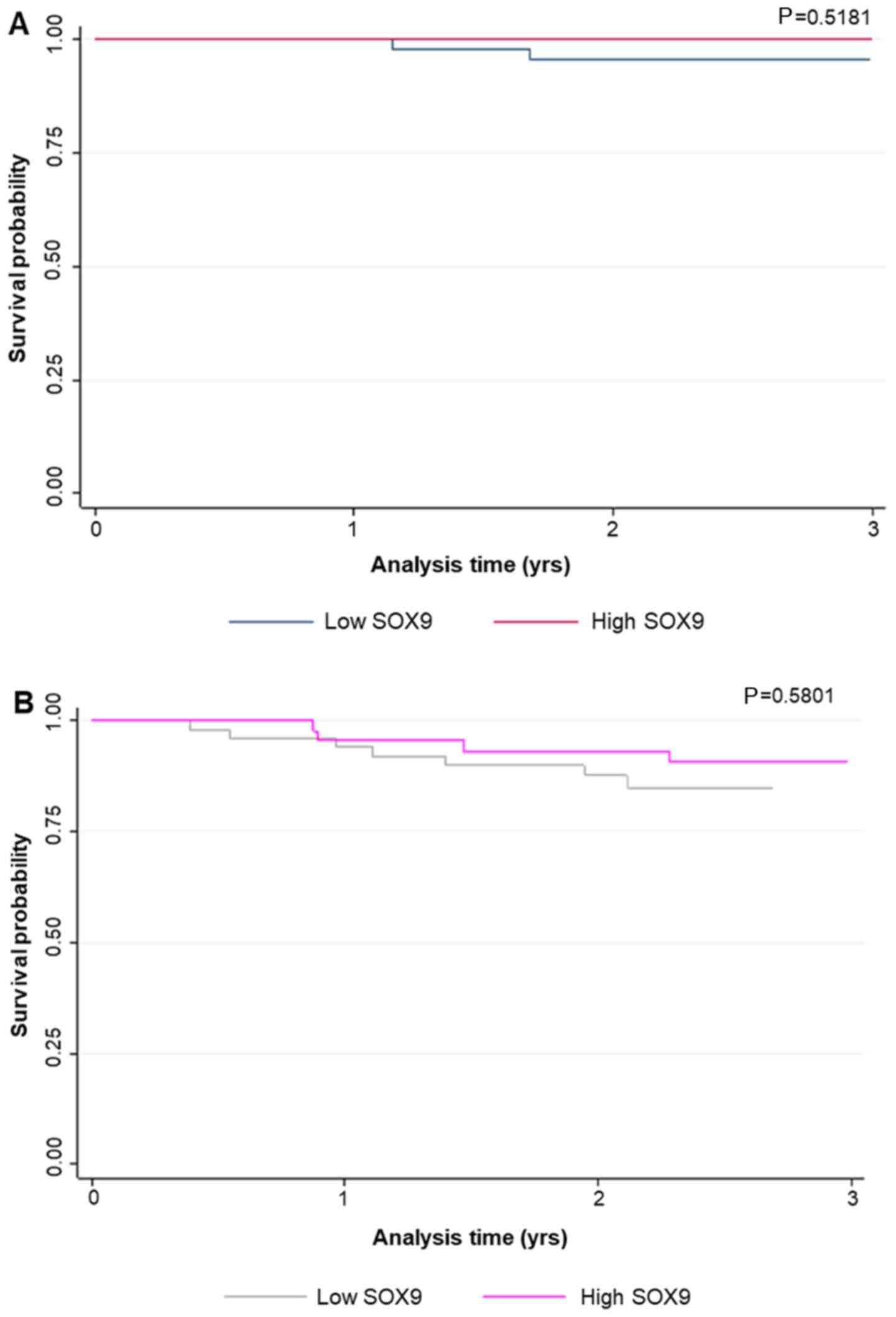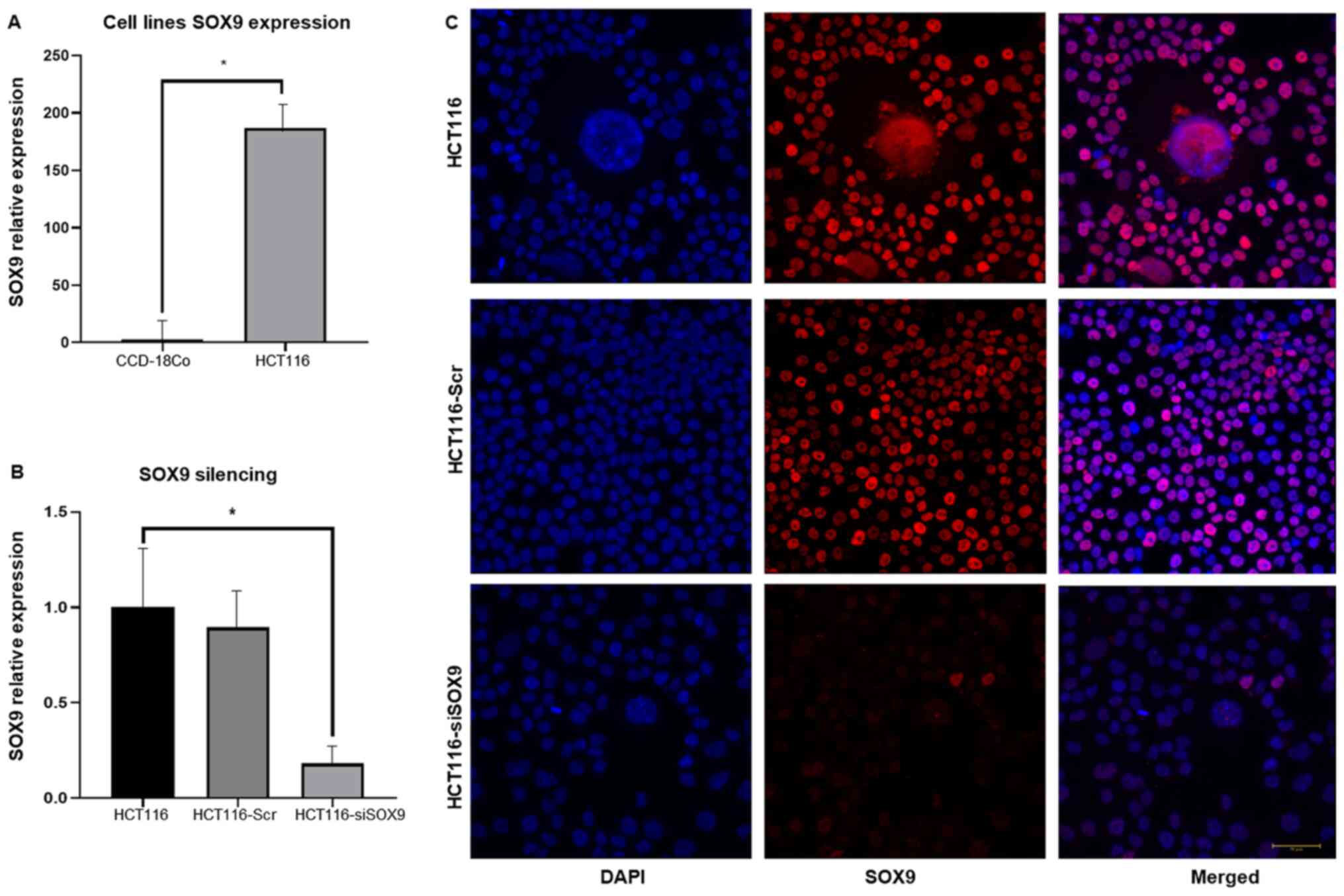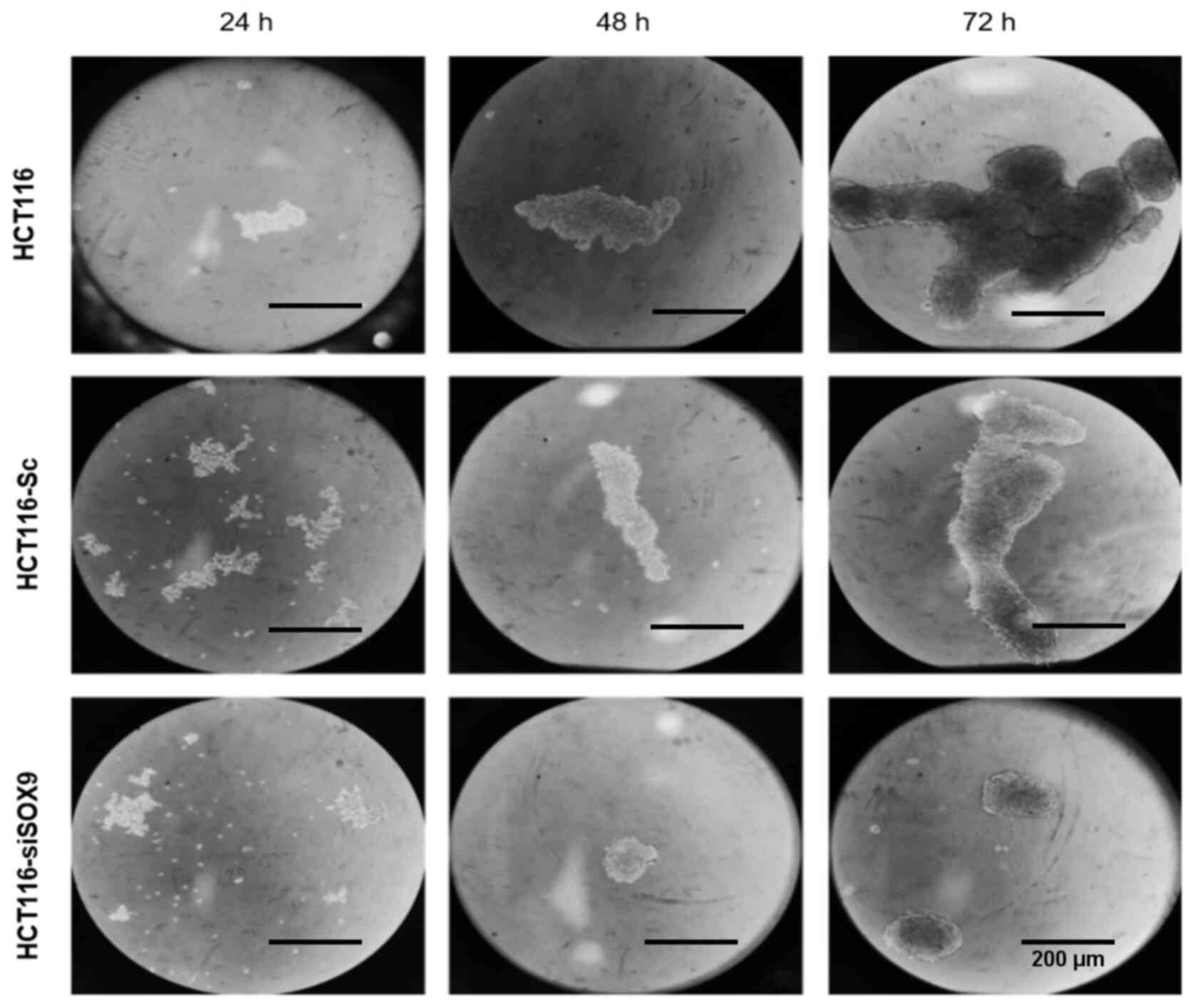|
1
|
Rawla P, Sunkara T and Barsouk A:
Epidemiology of colorectal cancer: Incidence, mortality, survival,
and risk factors. Prz Gastroenterol. 14:89–103. 2019.PubMed/NCBI
|
|
2
|
Bray F, Ferlay J, Soerjomataram I, Siegel
RL, Torre LA and Jemal A: Global cancer statistics 2018: GLOBOCAN
estimates of incidence and mortality worldwide for 36 cancers in
185 countries. CA Cancer J Clin. 68:394–424. 2018. View Article : Google Scholar : PubMed/NCBI
|
|
3
|
Hawkes N: Cancer survival data emphasise
importance of early diagnosis. BMJ. 364:l4082019. View Article : Google Scholar : PubMed/NCBI
|
|
4
|
Rojas-Puente L, de la Garza-Salazar JG,
Calderillo-Ruiz G, Lino-Silva LS, Millan SV, Noveron NR,
Meneses-Garcia A, de la Vega HA and Ruiz Garcia EB: Increased
incidence of colorectal cancer in young people (less than 40 years
old) over the last ten years. J Cancerology. 1:16–22. 2014.
|
|
5
|
Ahnen DJ, Wade SW, Jones WF, Sifri R,
Mendoza Silveiras J, Greenamyer J, Guiffre S, Axilbund J, Spiegel A
and You YN: The increasing incidence of young-onset colorectal
cancer: A call to action. Mayo Clin Proc. 89:216–224. 2014.
View Article : Google Scholar : PubMed/NCBI
|
|
6
|
Mishra DK, Veena U, Kaliki S, Kethiri AR,
Sangwan VS, Ali MH, Naik MN and Singh V: Differential expression of
stem cell markers in ocular surface squamous neoplasia. PLoS One.
11:e01618002016. View Article : Google Scholar : PubMed/NCBI
|
|
7
|
Brenner H, Kloor M and Pox CP: Colorectal
cancer. Lancet. 383:1490–1502. 2014. View Article : Google Scholar : PubMed/NCBI
|
|
8
|
Li W, Zhang G, Wang HL and Wang L:
Analysis of expression of cyclin E, p27kip1 and Ki67 protein in
colorectal cancer tissues and its value for diagnosis, treatment
and prognosis of disease. Eur Rev Med Pharmacol Sci. 20:4874–4879.
2016.PubMed/NCBI
|
|
9
|
Krausova M and Korinek V: Wnt signaling in
adult intestinal stem cells and cancer. Cell Signal. 26:570–579.
2014. View Article : Google Scholar : PubMed/NCBI
|
|
10
|
Gassler N: Paneth cells in intestinal
physiology and pathophysiology. World J Gastrointest Pathophysiol.
8:150–160. 2017. View Article : Google Scholar : PubMed/NCBI
|
|
11
|
Sailaja BS, He XC and Li L: The regulatory
niche of intestinal stem cells. J Physiol. 594:4827–4836. 2016.
View Article : Google Scholar : PubMed/NCBI
|
|
12
|
Jo A, Denduluri S, Zhang B, Wang Z, Yin L,
Yan Z, Kang R, Shi LL, Mok J, Lee MJ, et al: The versatile
functions of Sox9 in development, stem cells, and human diseases.
Genes Dis. 1:149–161. 2014. View Article : Google Scholar : PubMed/NCBI
|
|
13
|
Bastide P, Darido C, Pannequin J, Kist R,
Robine S, Marty-Double C, Bibeau F, Scherer G, Joubert D, Hollande
F, et al: Sox9 regulates cell proliferation and is required for
Paneth cell differentiation in the intestinal epithelium. J Cell
Biol. 178:635–648. 2007. View Article : Google Scholar : PubMed/NCBI
|
|
14
|
Morin PJ, Sparks AB, Korinek V, Barker N,
Clevers H, Vogelstein B and Kinzler KW: Activation of
beta-catenin-Tcf signaling in colon cancer by mutations in
beta-catenin or APC. Science. 275:1787–1790. 1997. View Article : Google Scholar : PubMed/NCBI
|
|
15
|
Korinek V, Barker N, Morin PJ, van Wichen
D, de Weger R, Kinzler KW, Vogelstein B and Clevers H: Constitutive
transcriptional activation by a beta-catenin-Tcf complex in APC-/-
colon carcinoma. Science. 275:1784–1787. 1997. View Article : Google Scholar : PubMed/NCBI
|
|
16
|
Javier BM, Yaeger R, Wang L, Sanchez-Vega
F, Zehir A, Middha S, Sadowska J, Vakiani E, Shia J, Klimstra D, et
al: Recurrent, truncating SOX9 mutations are associated with SOX9
overexpression, KRAS mutation, and TP53 wild type status in
colorectal carcinoma. Oncotarget. 7:50875–50882. 2016. View Article : Google Scholar : PubMed/NCBI
|
|
17
|
Aguilar-Medina M, Avendaño-Félix M,
Lizárraga-Verdugo E, Bermúdez M, Romero-Quintana JG, Ramos-Payan R,
Ruíz-García E and López-Camarillo C: SOX9 stem-cell factor:
Clinical and functional relevance in cancer. J Oncol.
2019:67540402019. View Article : Google Scholar : PubMed/NCBI
|
|
18
|
Blache P, van de Wetering M, Duluc I,
Domon C, Berta P, Freund JN, Clevers H and Jay P: SOX9 is an
intestine crypt transcription factor, is regulated by the Wnt
pathway, and represses the CDX2 and MUC2 genes. J Cell Biol.
166:37–47. 2004. View Article : Google Scholar : PubMed/NCBI
|
|
19
|
Lü B, Fang Y, Xu J, Wang L, Xu F, Xu E,
Huang Q and Lai M: Analysis of SOX9 expression in colorectal
cancer. Am J Clin Pathol. 130:897–904. 2008. View Article : Google Scholar
|
|
20
|
Shen Z, Deng H, Fang Y, Zhu X, Ye GT, Yan
L, Liu H and Li G: Identification of the interplay between SOX9 and
S100P in the metastasis and invasion of colon carcinoma.
Oncotarget. 6:20672–20684. 2015. View Article : Google Scholar : PubMed/NCBI
|
|
21
|
Choi BJ, Park SA, Lee SY, Cha YN and Surh
YJ: Hypoxia induces epithelial-mesenchymal transition in colorectal
cancer cells through ubiquitin-specific protease 47-mediated
stabilization of Snail: A potential role of Sox9. Sci Rep.
7:159182017. View Article : Google Scholar : PubMed/NCBI
|
|
22
|
Zhang S, Che D, Yang F, Chi C, Meng H,
Shen J, Qi L, Liu F, Lv L, Li Y, et al: Tumor-associated
macrophages promote tumor metastasis via the TGF-β/SOX9 axis in
non-small cell lung cancer. Oncotarget. 8:99801–99815. 2017.
View Article : Google Scholar : PubMed/NCBI
|
|
23
|
Carrasco-Garcia E, Lopez L, Aldaz P,
Arevalo S, Aldaregia J, Egaña L, Bujanda L, Cheung M, Sampron N,
Garcia I, et al: SOX9-regulated cell plasticity in colorectal
metastasis is attenuated by rapamycin. Sci Rep. 6:323502016.
View Article : Google Scholar : PubMed/NCBI
|
|
24
|
Matheu A, Collado M, Wise C, Manterola L,
Cekaite L, Tye AJ, Canamero M, Bujanda L, Schedl A, Cheah KS, et
al: Oncogenicity of the developmental transcription factor Sox9.
Cancer Res. 72:1301–1315. 2012. View Article : Google Scholar : PubMed/NCBI
|
|
25
|
Jay P, Berta P and Blache P: Expression of
the carcinoembryonic antigen gene is inhibited by SOX9 in human
colon carcinoma cells. Cancer Res. 65:2193–2198. 2005. View Article : Google Scholar : PubMed/NCBI
|
|
26
|
Zalzali H, Naudin C, Bastide P,
Quittau-Prévostel C, Yaghi C, Poulat F, Jay P and Blache P:
CEACAM1, a SOX9 direct transcriptional target identified in the
colon epithelium. Oncogene. 27:7131–7138. 2008. View Article : Google Scholar : PubMed/NCBI
|
|
27
|
Marcker Espersen ML, Linnemann D,
Christensen IJ, Alamili M, Troelsen JT and Høgdall E: SOX9
expression predicts relapse of stage II colon cancer patients. Hum
Pathol. 52:38–46. 2016. View Article : Google Scholar : PubMed/NCBI
|
|
28
|
Lai CC, You JF, Yeh CY, Chen JS, Tang R,
Wang JY and Chin CC: Low preoperative serum albumin in colon
cancer: A risk factor for poor outcome. Int J Colorectal Dis.
26:473–481. 2011. View Article : Google Scholar : PubMed/NCBI
|
|
29
|
Boonpipattanapong T and Chewatanakornkul
S: Preoperative carcinoembryonic antigen and albumin in predicting
survival in patients with colon and rectal carcinomas. J Clin
Gastroenterol. 40:592–595. 2006. View Article : Google Scholar : PubMed/NCBI
|
|
30
|
Dimitriou N, Arandjelović O, Harrison DJ
and Caie PD: A principled machine learning framework improves
accuracy of stage II colorectal cancer prognosis. NPJ Digit Med.
1:522018. View Article : Google Scholar : PubMed/NCBI
|
|
31
|
Vera R, Aparicio J, Carballo F, Esteva M,
González-Flores E, Santianes J, Santolaya F and Fernández-Cebrián
JM: Recommendations for follow-up of colorectal cancer survivors.
Clin Transl Oncol. 21:1302–1311. 2019. View Article : Google Scholar : PubMed/NCBI
|
|
32
|
van Diest PJ, van Dam P, Henzen-Logmans
SC, Berns E, van der Burg ME, Green J and Vergote I; European
Organization for Research and Treatment of Cancer-Gynaecological
Cancer Cooperative Group, : A scoring system for
immunohistochemical staining: Consensus report of the task force
for basic research of the EORTC-GCCG. J Clin Pathol. 50:801–804.
1997. View Article : Google Scholar : PubMed/NCBI
|
|
33
|
Livak KJ and Schmittgen TD: Analysis of
relative gene expression data using real-time quantitative PCR and
the 2(-Delta Delta C(T)) method. Methods. 25:402–408. 2001.
View Article : Google Scholar : PubMed/NCBI
|
|
34
|
Lizárraga-Verdugo E, Ruiz-García E,
López-Camarillo C, Bermúdez M, Avendaño-Félix M, Ramos-Payán R,
Romero-Quintana G, Ayala-Ham A, Villegas-Mercado C, Pérez-Plasencia
C, et al: Cell curvival is regulated via SOX9/BCL2L1 axis in
HCT-116 colorectal cancer cell line. J Oncol. 2020:57015272020.
View Article : Google Scholar
|
|
35
|
Wang L, He S, Yuan J, Mao X, Cao Y, Zong
J, Tu Y and Zhang Y: Oncogenic role of SOX9 expression in human
malignant glioma. Med Oncol. 29:3484–3490. 2012. View Article : Google Scholar : PubMed/NCBI
|
|
36
|
Mauri G, Sartore-Bianchi A, Russo AG,
Marsoni S, Bardelli A and Siena S: Early-onset colorectal cancer in
young individuals. Mol Oncol. 13:109–131. 2019. View Article : Google Scholar : PubMed/NCBI
|
|
37
|
Xicola RM, Manojlovic Z, Augustus GJ,
Kupfer SS, Emmadi R, Alagiozian-Angelova V, Triche T Jr, Salhia B,
Carpten J, Llor X, et al: Lack of APC somatic mutation is
associated with early-onset colorectal cancer in African Americans.
Carcinogenesis. 39:1331–1341. 2018. View Article : Google Scholar : PubMed/NCBI
|
|
38
|
Wan YP, Xi M, He HC, Wan S, Hua W, Zen ZC,
Liu YL, Zhou YL, Mo RJ, Zhuo YJ, et al: Expression and clinical
significance of SOX9 in renal cell carcinoma, bladder cancer and
penile cancer. Oncol Res Treat. 40:15–20. 2017. View Article : Google Scholar : PubMed/NCBI
|
|
39
|
Mesquita P, Freire AF, Lopes N, Gomes R,
Azevedo D, Barros R, Pereira B, Cavadas B, Pópulo H, Boaventura P,
et al: Expression and clinical relevance of SOX9 in gastric cancer.
Dis Markers. 2019:82670212019. View Article : Google Scholar : PubMed/NCBI
|
|
40
|
Prévostel C and Blache P: The
dose-dependent effect of SOX9 and its incidence in colorectal
cancer. Eur J Cancer. 86:150–157. 2017. View Article : Google Scholar
|
|
41
|
Lytle NK, Barber AG and Reya T: Stem cell
fate in cancer growth, progression and therapy resistance. Nat Rev
Cancer. 18:669–680. 2018. View Article : Google Scholar : PubMed/NCBI
|
|
42
|
Beck B and Blanpain C: Unravelling cancer
stem cell potential. Nat Rev Cancer. 13:727–738. 2013. View Article : Google Scholar : PubMed/NCBI
|
|
43
|
Kuşoğlu A and Biray Avcı Ç: Cancer stem
cells: A brief review of the current status. Gene. 681:80–85. 2019.
View Article : Google Scholar
|
|
44
|
Boland CR, Thibodeau SN, Hamilton SR,
Sidransky D, Eshleman JR, Burt RW, Meltzer SJ, Rodriguez-Bigas MA,
Fodde R, Ranzani GN, et al: A National Cancer Institute Workshop on
Microsatellite Instability for cancer detection and familial
predisposition: Development of international criteria for the
determination of microsatellite instability in colorectal cancer.
Cancer Res. 58:5248–5257. 1998.PubMed/NCBI
|
|
45
|
Boland CR and Goel A: Microsatellite
instability in colorectal cancer. Gastroenterology.
138:2073–2087.e3. 2010. View Article : Google Scholar : PubMed/NCBI
|
|
46
|
Santos JC, Carrasco-Garcia E, Garcia-Puga
M, Aldaz P, Montes M, Fernandez-Reyes M, de Oliveira CC, Lawrie CH,
Araúzo-Bravo MJ, Ribeiro ML, et al: SOX9 Elevation Acts with
Canonical WNT Signaling to Drive Gastric Cancer Progression. Cancer
Res. 76:6735–6746. 2016. View Article : Google Scholar : PubMed/NCBI
|
|
47
|
Wang J, Xue X, Hong H, Qin M, Zhou J, Sun
Q, Liang H and Gao L: Upregulation of microRNA-524-5p enhances the
cisplatin sensitivity of gastric cancer cells by modulating
proliferation and metastasis via targeting SOX9. Oncotarget.
8:574–582. 2017. View Article : Google Scholar : PubMed/NCBI
|
|
48
|
Higashihara T, Yoshitomi H, Nakata Y,
Kagawa S, Takano S, Shimizu H, Kato A, Furukawa K, Ohtsuka M and
Miyazaki M: Sex determining region Y box 9 induces chemoresistance
in pancreatic cancer cells by induction of putative cancer stem
cell characteristics and its high expression predicts poor
prognosis. Pancreas. 46:1296–1304. 2017. View Article : Google Scholar : PubMed/NCBI
|
|
49
|
Aguilar-Medina M, Avendaño-Félix M,
Lizárraga-Verdugo E, Bermúdez M, Romero-Quintana JG, Ramos-Payan R,
Ruíz-García E and López-Camarillo C: SOX9 stem-cell factor:
Clinical and functional relevance in cancer. J Oncol.
2019:67540402019. View Article : Google Scholar : PubMed/NCBI
|
|
50
|
Liu C, Liu L, Chen X, Cheng J, Zhang H,
Shen J, Shan J, Xu Y, Yang Z, Lai M, et al: Sox9 regulates
self-renewal and tumorigenicity by promoting symmetrical cell
division of cancer stem cells in hepatocellular carcinoma.
Hepatology. 64:117–129. 2016. View Article : Google Scholar : PubMed/NCBI
|
|
51
|
Network TCGA; Cancer Genome Atlas Network,
: Comprehensive molecular characterization of human colon and
rectal cancer. Nature. 487:330–337. 2012. View Article : Google Scholar : PubMed/NCBI
|
|
52
|
Bahmad HF, Cheaito K, Chalhoub RM, Hadadeh
O, Monzer A, Ballout F, El-Hajj A, Mukherji D, Liu YN, Daoud G, et
al: Sphere-formation assay: Three-dimensional in vitro culturing of
prostate cancer stem/progenitor sphere-forming cells. Front Oncol.
8:3472018. View Article : Google Scholar : PubMed/NCBI
|
|
53
|
Shaheen S, Ahmed M, Lorenzi F and Nateri
AS: Spheroid-Formation (Colonosphere) Assay for in vitro assessment
and expansion of stem cells in colon cancer. Stem Cell Rev Rep.
12:492–499. 2016. View Article : Google Scholar : PubMed/NCBI
|
|
54
|
Terasaki M, Matsumoto N, Hashimoto R, Endo
T, Maeda H, Hamada J, Osada K, Miyashita K and Mutoh M: Fucoxanthin
administration delays occurrence of tumors in xenograft mice by
colonospheres, with an anti-tumor predictor of glycine. J Clin
Biochem Nutr. 64:52–58. 2019. View Article : Google Scholar : PubMed/NCBI
|
|
55
|
Rennebeck G, Martelli M and Kyprianou N:
Anoikis and survival connections in the tumor microenvironment: Is
there a role in prostate cancer metastasis? Cancer Res.
65:11230–11235. 2005. View Article : Google Scholar : PubMed/NCBI
|
|
56
|
Stratton MR: Exploring the genomes of
cancer cells: Progress and promise. Science. 331:1553–1558. 2011.
View Article : Google Scholar : PubMed/NCBI
|
|
57
|
Jinesh GG, Choi W, Shah JB, Lee EK, Willis
DL and Kamat AM: Blebbishields, the emergency program for cancer
stem cells: Sphere formation and tumorigenesis after apoptosis.
Cell Death Differ. 20:382–395. 2013. View Article : Google Scholar : PubMed/NCBI
|
|
58
|
Larsimont J-C, Youssef KK, Sánchez-Danés
A, Sukumaran V, Defrance M, Delatte B, Liagre M, Baatsen P, Marine
JC, Lippens S, et al: Sox9 controls self-renewal of oncogene
targeted cells and links tumor initiation and invasion. Cell Stem
Cell. 17:60–73. 2015. View Article : Google Scholar : PubMed/NCBI
|
|
59
|
Prévostel C, Rammah-Bouazza C, Trauchessec
H, Canterel-Thouennon L, Busson M, Ychou M and Blache P: SOX9 is an
atypical intestinal tumor suppressor controlling the oncogenic
Wnt/β-catenin signaling. Oncotarget. 7:82228–82243. 2016.
View Article : Google Scholar
|
|
60
|
Ma XL, Hu B, Tang WG, Xie S-H, Ren N, Guo
L and Lu RQ: CD73 sustained cancer-stem-cell traits by promoting
SOX9 expression and stability in hepatocellular carcinoma. J
Hematol Oncol. 13:112020. View Article : Google Scholar : PubMed/NCBI
|
|
61
|
Richtig G, Aigelsreiter A, Schwarzenbacher
D, Ress AL, Adiprasito JB, Stiegelbauer V, Hoefler G, Schauer S,
Kiesslich T, Kornprat P, et al: SOX9 is a proliferation and stem
cell factor in hepatocellular carcinoma and possess widespread
prognostic significance in different cancer types. PLoS One.
12:e01878142017. View Article : Google Scholar : PubMed/NCBI
|















